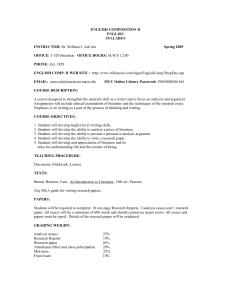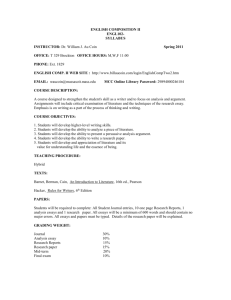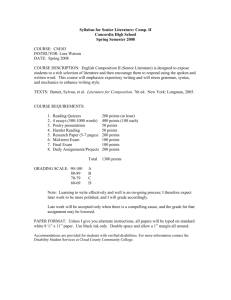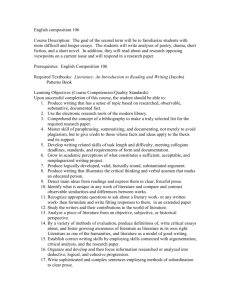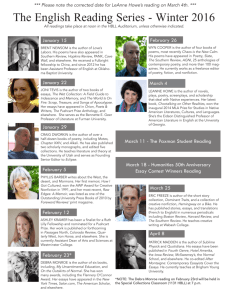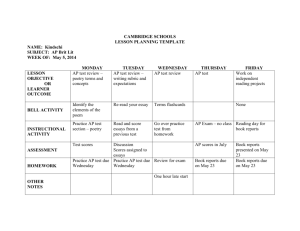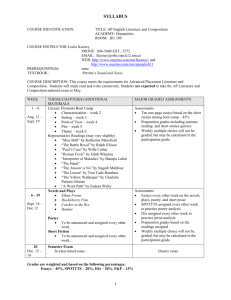ENGLISH III Mr. Santiago—Room 203 Course overview (Subject to
advertisement
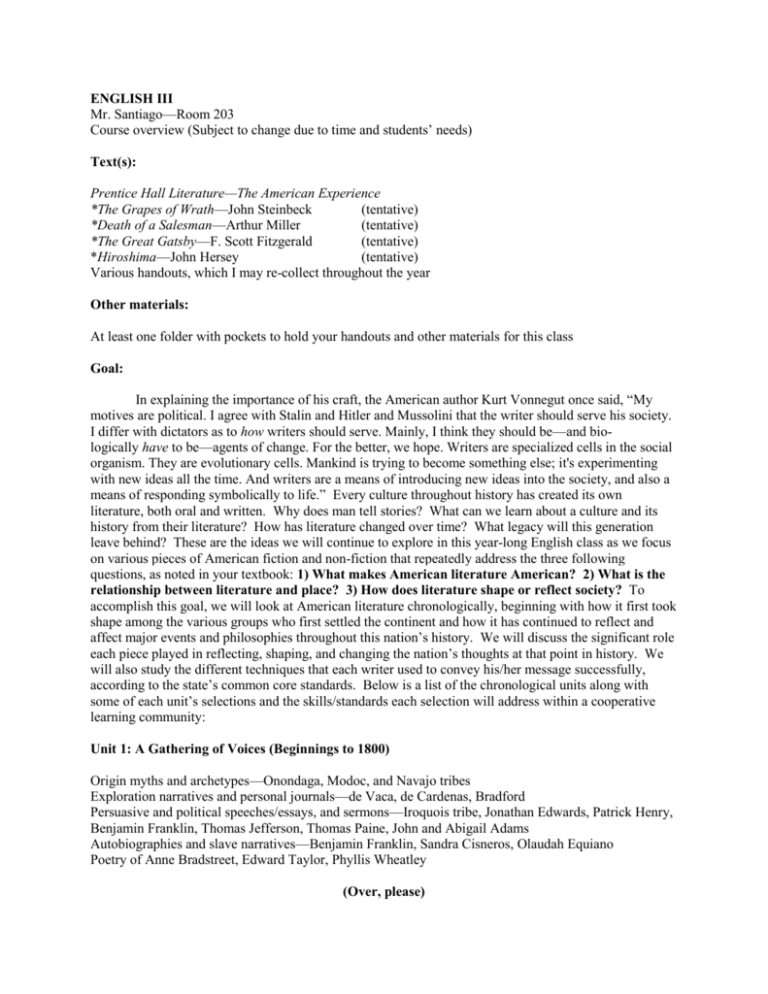
ENGLISH III Mr. Santiago—Room 203 Course overview (Subject to change due to time and students’ needs) Text(s): Prentice Hall Literature—The American Experience *The Grapes of Wrath—John Steinbeck (tentative) *Death of a Salesman—Arthur Miller (tentative) *The Great Gatsby—F. Scott Fitzgerald (tentative) *Hiroshima—John Hersey (tentative) Various handouts, which I may re-collect throughout the year Other materials: At least one folder with pockets to hold your handouts and other materials for this class Goal: In explaining the importance of his craft, the American author Kurt Vonnegut once said, “My motives are political. I agree with Stalin and Hitler and Mussolini that the writer should serve his society. I differ with dictators as to how writers should serve. Mainly, I think they should be—and biologically have to be—agents of change. For the better, we hope. Writers are specialized cells in the social organism. They are evolutionary cells. Mankind is trying to become something else; it's experimenting with new ideas all the time. And writers are a means of introducing new ideas into the society, and also a means of responding symbolically to life.” Every culture throughout history has created its own literature, both oral and written. Why does man tell stories? What can we learn about a culture and its history from their literature? How has literature changed over time? What legacy will this generation leave behind? These are the ideas we will continue to explore in this year-long English class as we focus on various pieces of American fiction and non-fiction that repeatedly address the three following questions, as noted in your textbook: 1) What makes American literature American? 2) What is the relationship between literature and place? 3) How does literature shape or reflect society? To accomplish this goal, we will look at American literature chronologically, beginning with how it first took shape among the various groups who first settled the continent and how it has continued to reflect and affect major events and philosophies throughout this nation’s history. We will discuss the significant role each piece played in reflecting, shaping, and changing the nation’s thoughts at that point in history. We will also study the different techniques that each writer used to convey his/her message successfully, according to the state’s common core standards. Below is a list of the chronological units along with some of each unit’s selections and the skills/standards each selection will address within a cooperative learning community: Unit 1: A Gathering of Voices (Beginnings to 1800) Origin myths and archetypes—Onondaga, Modoc, and Navajo tribes Exploration narratives and personal journals—de Vaca, de Cardenas, Bradford Persuasive and political speeches/essays, and sermons—Iroquois tribe, Jonathan Edwards, Patrick Henry, Benjamin Franklin, Thomas Jefferson, Thomas Paine, John and Abigail Adams Autobiographies and slave narratives—Benjamin Franklin, Sandra Cisneros, Olaudah Equiano Poetry of Anne Bradstreet, Edward Taylor, Phyllis Wheatley (Over, please) Unit 2: A Growing Nation (1800-1870) “The Devil and Tom Walker”—Washington Irving (characterization, theme) Selected poems of William Cullen Bryant, Henry Wadsworth Longfellow, and Oliver Wendell Holmes (meter, theme) “The Minister’s Black Veil”—Nathaniel Hawthorne (symbols and parables) “The Raven” and “The Fall of the House of Usher”—Edgar Allen Poe (poetry meter and themes, Gothic literature) Joyce Carol Oates (modern Gothic literature) Moby Dick—Herman Melville (symbols and themes) Ralph Waldo Emerson and Henry David Thoreau (metaphors, analogies, themes) Emily Dickinson and Walt Whitman (rhyme/rhythm and types of poetry) Unit 3: Division, Reconciliation, and Expansion (1850-1914) “An Occurrence at Owl Creek Bridge”—Ambrose Bierce (point of view, Civil War fiction) Additional Civil War and slavery journals and diaries—Frederick Douglass, Sojourner Truth “An Episode of War”—Stephen Crane (Naturalism) Spirituals, Biblical allusions, and allegory “The Gettysburg Address”—Abraham Lincoln (diction and effective public speaking) The humor of Mark Twain and the concept of “American” humor “To Build a Fire”—Jack London (conflict and realism) “The Story of an Hour” by Kate Chopin and “A Wagner Matinee” by Willa Cather (irony, philosophical arguments, and characterization) Poetry of the period (as affected by the time period and as expressed through elements of the poems) Unit 4: Disillusion, Defiance, and Discontent (1914-1945) “The Love Song of J. Alfred Prufrock”—T.S Eliot (Dramatic Monologue and allusions in poetry) Ezra Pound and William Carlos Williams (Imagism in poetry) “Winter Dreams”—F. Scott Fitzgerald (making inferences about characters) “The Turtle” from The Grapes of Wrath—John Steinbeck (allegory and symbolism) Satire, tone, apostrophe, blank verse, and other poetic devices in poetry from that time period, including the Harlem Renaissance “A Rose for Emily”—William Faulkner (ambiguity and resolution) “The Jilting of Granny Weatherall”—Katherine Anne Porter (Stream-of-Consciousness writing) “A Worn Path”—Eudora Welty (Archetypes) Unit 5: prosperity and Protest (1945-1970) From Hiroshima—John Hersey (implied themes and authors’ political views) Symbols and their uses (e.g. persuasion) “The Life You Save May Be Your Own”—Flannery O’ Connor (Grotesque characters, themes) Poems by Lawrence Ferlinghetti, Sylvia Plath, and Anne Sexton (Extended metaphors) Interpreting connotations in pieces of fiction and non-fiction Poems by Gwendolyn Brooks and Robert Hayden (repetition and parallelism) Elizabeth Bishop—diction (word choice) and other rhetorical devices “The Rock Pile”—James Baldwin (setting, cause and effect) The Crucible—Arthur Miller (conflict, Biblical allusions, themes, tragedy, and allegory) Unit 6: New Voices, New Frontiers (1970-present) “Everyday Use”—Alice Walker (characterization, dialect) “Everything Stuck to Him”—Raymond Carver (author’s style) Poems by William Stafford, Denise Levertov, Li-Young Lee (lyric poetry, epiphany) Free verse poetry Modern non-fiction: Parody and satire Expository essays Comparison-and-contrast essays Reflective essays Oral histories Memoirs Along with identifying the skills and techniques noted above, you will also be asked to display your understanding of them by way of addressing various aspects of grammar and standardized testing (ACT practice tests) and also by completing a variety of brief and extended written responses, as noted below: Interpretive essays Reflective essays Compare-and-Contrast essays Persuasive essays Literary comparison/analysis essays and other responses to literature Personal narratives Editorials Various analytical responses to writers’ techniques Research essays I have created a web site for this class, which includes a list of up-coming classroom activities, homework assignments, quizzes and tests, along with links where you can download many of the handouts that you will receive in class. I update the site at the beginning of each week, and I encourage you to check the web site regularly, especially if you are absent or know that you will be absent, so that you do not fall behind on any class work. To access the site, do the following: 1) Go to www.midviewk12.org. This is the district’s home page. 2) From there go to Midview High School from the drop-down window near the upper left hand side of the screen. 3) Once you are on the high school’s home page, click on the Learning Resource Center’s (LRC) home page link on the left-hand side of the site. 4) Then on the LRC’s home page, click on “other links.” On the next screen you will find the link for my English III class. If you have any questions or problems let me know by using my school e-mail address: lsantiago@midviewk12.org. Final comment My goal is for everyone to succeed in this class. However, to accomplish this goal, everyone, including the individual student and the teacher, must do his/her job. If you ever have any questions, concerns, or suggestions for class activities, please let me know, so that I can help you succeed.

